Sri Lanka must claim Observer status at Panchsheel commemorative events in Beijing
Posted on June 26th, 2014
by Senaka Weeraratna
Sino – India rapprochement will have significant ramifications not only in Asia but throughout the world in the coming years.
It is reported that the Panchsheel commemorative events will be held in Beijing on June 28 and 29, 2014 in which Vice-President Hamid Ansari, Myanmar President U Thein Sein and Chinese President Xi Jinping will take part.
The seed for forging strong ties between the newly liberated India (from British colonial rule in 1947) and the newly established People’s Republic of China (in 1949) took place in June 1954, during a recess in the Geneva conference discussing the future of Indo-China including the grant of independence and re-unification of Vietnam, following the defeat of the French colonial forces in the battle of Dien Bien Phu by the Viet Minh led by General Võ Nguyên Giáp in May 1954.
V K Krishna Menon, India’s representative at the conference extended an invitation to the Chinese Premier Chou En-Lai to visit India. It was accepted. The ensuing talks between Chou En-Lai and Indian Prime Minister Jawaharlal Nehru ended on June 28, 1954 in the signing of a joint statement on the principles on which relations between India and China were to be based. These principles, which were subsequently known as the Five Principles of Peaceful Co-Existence or Panchsheel, were: (1) mutual respect for each other’s territorial integrity and sovereignty; (2) non-aggression; (3) non-interference in each other’s internal affairs; (4) equality and mutual benefit; and (5) peaceful coexistence.
Handshake between China’s supreme leader Chairman Mao Tse Tung and Indian Prime Minister Jawaharlal Nehru
June 1954: Prime Ministers Chou En lai and Jawaharlal Nehru in New Delhi for the signing of the Panchsheel Agreement
Colombo Conference of 1954
This meeting in June 1954 followed a significant five South Asian Premiers three day mini – summit held in Colombo, Ceylon from April 29 to May 2, 1954 to prepare a plan for a solution of the Indo – China conflict and organised at the initiative of Sir John Kotelawala, Prime Minister of Ceylon (as Sri Lanka was then called) to which Prime Ministers of Burma (U Nu), India (Jawaharlal Nehru), Indonesia (Ali Sastroamidjojo), and Pakistan (Mohammed Ali) were invited.
 Photo – left to right Sir John Kotelawala (Ceylon), U Nu (Burma),Ali Sastroamidjojo (Indonesia), Mohammed Ali( Pakistan), Jawaharlal Nehru (India)
Photo – left to right Sir John Kotelawala (Ceylon), U Nu (Burma),Ali Sastroamidjojo (Indonesia), Mohammed Ali( Pakistan), Jawaharlal Nehru (India)
It was at this Colombo Conference that the desirability of holding a conference of Asian and African nations was discussed and the Indonesian Prime Minister, Dr. Ali Sastromidjojo was the main exponent of the need for such a conference with which a new foundation could be laid for a new movement of independent nations in Asia and Africa.
Sri Lanka – then Ceylon – played a key role in the initial phase by organising the conference of the Colombo Powers, from which followed the Bogor Conference which, in fact, was the prelude to Bandung.
It was at the Bogor Conference that a decision was taken in respect of the number of countries to be invited to the Bandung, and in the original list, there were thirty countries, and in addition the Bogor Conference laid down four principles and the purposes of the proposed Asian African Conference.
The first purpose was to explore and advance the mutual as well as common interests of the participants; second, to view the position of Asia and Africa and their peoples in the world of today and the contribution they can make to the promotion of world peace and cooperation.
Implications of the Colombo Conference
In 1954, it was at this Colombo Conference that the perceptive Indonesian Prime Minister Dr. Ali Sastriomidjojo asked the following question – Where do we stand now, we the people of Asia, in this world of ours today?
The Bandung Conference was convened to provide an answer to this question, and the leaders of Asia and Africa responded innovatively by supplying answers to that question.
This question despite marked changes in the international arena is still valid 70 years down the track though in a re-formulated form as follows:
We the people of Asia and Africa; where do we stand today in a world still largely controlled and manipulated by neo – colonial western powers who dominate the international mass media and dream of re-colonization and plunder of resources if not directly or at least indirectly by a series of manipulative acts using the rhetoric of Human Rights and Rule of Law, and international institutions e.g. agencies of the UN, as tools to do the spade work e.g. regime change, de-stabilization of countries asserting neutrality and independence from western dominance?
Bandung Conference of 1955
The first Asian-African conference was held at Bandung, Indonesia, from April 18 to 24, 1955. It was sponsored by Burma (now Myanmar), Ceylon (now Sri Lanka), India, Indonesia and Pakistan and attended by 18 other countries from Asia (Afghanistan, Cambodia, Democratic Republic of Vietnam, Iran, Iraq, Japan, Jordan, Laos, Lebanon, Nepal, Peoples Republic of China, Philippines, Saudi Arabia, South Vietnam, Syria, Thailand, Turkey and Yemen) and 6 countries from Africa (Egypt, Ethiopia, Gold Coast [now Ghana], Liberia, Libya and Sudan). The rationale for holding of the Conference was based on a common understanding by the leaders of the newly de-colonised and liberated nations of Asia and Africa, that unless they come and work together as a collective force on the world stage their hard won struggle for freedom would be lost quickly to the very nations that had colonized them and grudgingly granted them independence but had not given up their dream of re-colonization.
Prime Minister Chou Enlai addresses the Bandung Conference (1955)
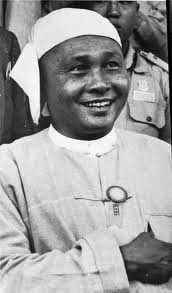 Prime Minister U Nu ( Burma) at Bandung Conference
Prime Minister U Nu ( Burma) at Bandung Conference
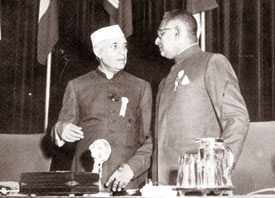 Sir John Kotelawala has a word with Jawaharlal Nehru, the Indian Premier. An informal picture taken at the Bandung Conference of 1955.
Sir John Kotelawala has a word with Jawaharlal Nehru, the Indian Premier. An informal picture taken at the Bandung Conference of 1955.
The holding of the Bandung Conference in April 1955 represented a watershed moment in the sphere of international relations. It was a landmark event. It was the most significant collective expression of the resurgence of Asia and Africa since the commencement of the process of de-colonization in the aftermath of the end of the second world war and the emergence of independent nations outside Europe. These new nations were to become a new set of actors in the global arena and in turn they created the Non-aligned movement.
However the most notable impact of the Bandung Conference was that it symbolized the collapse of colonialism and the rise of a large group of nations united by a shared past of oppression under western dominance and increasingly confident of challenging the hegemonic role of the Western powers in the arena of international politics.
Asian Relations Conference in Delhi (1947)
But the Bandung Conference was not without its antecedents. The ground for its eventuation was set in the period 1947 – 1955 by a series of freedom fighters of the calibre of Jawaharlal Nehru, S. W. R. D. Bandaranaike and Sukarno. They gave voice in eloquent language to dreams long suppressed by colonialism and began to assert their rightful place and equality of status in the international arena.
India’s first Prime Minister, Jawaharlal Nehru was in the forefront in the struggle against colonial oppression. Nehru played a critical role in espousing the cause of the third-world countries. In a radio address in September 1947, Nehru, who then headed the interim government, stated that India would not join groups of states that were aligned against each other but would strive to establish friendly relations with all countries. Nehru had already conceived of a closer association of the Asian countries for evolving a common foreign policy. During his visit to South-East Asian countries in March 1946, Nehru not only secured the support for his idea but also got the needed consent from leaders of Burma, Indonesia and so on for holding a conference for that purpose.
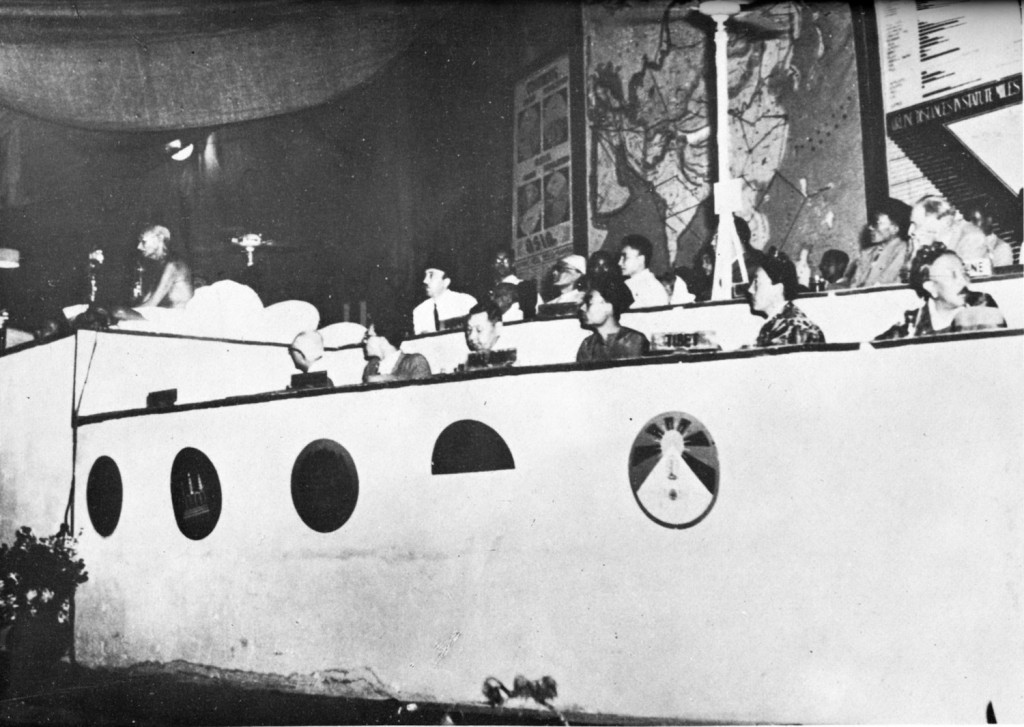 Photo – First Inter-Asian ( or Asian Relations) Conference, Delhi, 1947.
Photo – First Inter-Asian ( or Asian Relations) Conference, Delhi, 1947.
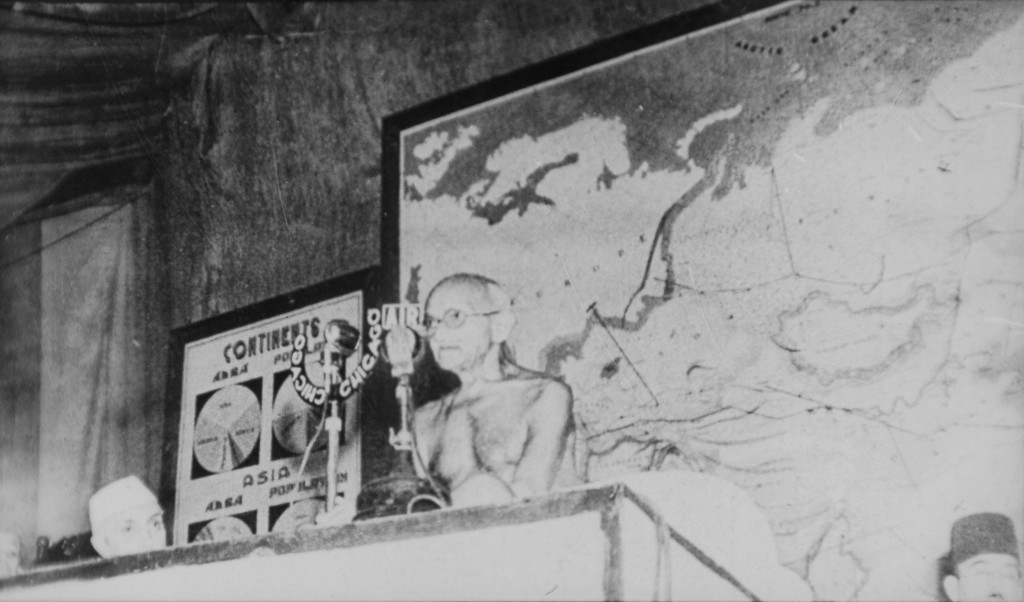 Photo – Mahatma Gandhi addressing the Asian Relations Conference in Delhi, 1947
Photo – Mahatma Gandhi addressing the Asian Relations Conference in Delhi, 1947
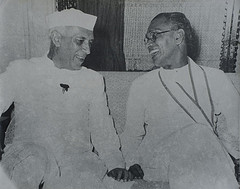 Photo – Prime Minister S. W. R. D. Bandaranaike with Indian Prime Minister Pundit Jawaharlal Nehru
Photo – Prime Minister S. W. R. D. Bandaranaike with Indian Prime Minister Pundit Jawaharlal Nehru
The Asian Relations Conference that was held in Delhi at a non-governmental level under the auspices of the Indian Council of World Affairs from March 23 to April 02, 1947 was the outcome of Nehru’s endeavours. It was attended by delegations from 28 countries including some of the Asian republics of the then Soviet Union. Observers came from the United Nations, the Arab League, and from institutes of international relations of Australia, Britain, USA and USSR. The conference helped strengthen the solidarity of Asian nations and was a predecessor of the Bandung Conference.
The Asian Relations Conference of 1947 astutely anticipated the rise of a new spirit in both Asia and Africa. S. W. R. D. Bandaranaike, farsightedly seeing the potentiality of the conference as the forerunner of a powerful movement, stated that “this conference is the beginning of something much greater-a federation of free and equal Asiatic countries, working not merely for our own advantage but for the progress and peace of all mankind”.
Bandaranaike’s speech at this conference in 1947 conveyed a clear message addressed to all independent countries in Asia and Africa, which had emerged out of colonialism.
It is these contributions by Ceylon (now Sri Lanka) in the pre- Bandung and pre – Panchasheel Agreement signing in June 1954 that strengthens its claim for recognition on par with Myanmar to be present in an official capacity having at least Observer status on the occasion of Panchsheel commemorative events which will be held in Beijing on June 28 and 29 in which Vice-President Hamid Ansari, Myanmar President U Thein Sein and Chinese President Xi Jinping will take part.
Conclusion
The time has come for India together with China to co –sponsor a world summit to mark resurgence of Asia and Africa and revive the spirit of ‘Bandung’ Conference of 1955.
The 50th anniversary of the Bandung Conference of 1955 will fall in April 2015. It is an occasion that must be marked with great celebration and getting together of nations that were victims of colonial oppression and also to herald the dawn of a new Asia under Sino – Indian leadership.
Senaka Weeraratna
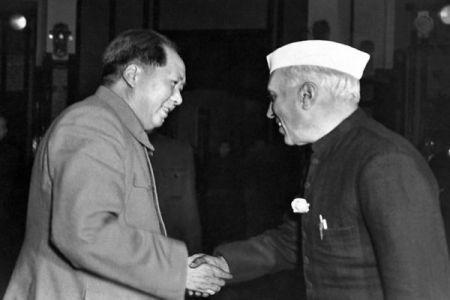
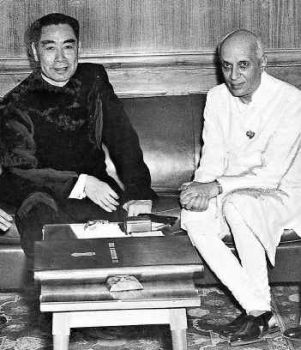
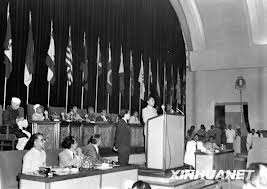
June 26th, 2014 at 4:22 pm
Endia and China have DIFFERENT and OPPOSING views. They are both money minded greedy countries like USA and UK which is NOT bad.
With or without USA pitting them against each other, they CANNOT come together.
June 27th, 2014 at 2:21 pm
a change in the government of India has not changed Beijing’s regional policies. the US still wants to “contain” China using India. India has massive corruption problems that have not even had time to be handled by the new government.
The relationship that could happen between India and China is also dictated by Washington and Moscow. India has pulled away from Moscow after the Soviet Empire collapsed and moved closer to the US to the point that she is now figured as one of the nations the US considers in “containing” China’s expansion policies.
In the meantime Moscow and the US have met face to face in Syria, Iran, and Ukraine. In Syria and Iran Moscow has won. It is most likely Moscow will win in Ukraine even though Ukraine today signed to be a member of the EU. Moscow can retaliate with trade restrictions, cut off of gas supply and the removal of Russian migrant workers from Ukraine. In addition Moscow and China plan an “economic bomb’ on the US by using other currencies than the US dollar in bilateral transactions. China is moving to build a new bank separate from the World bank and the IMF.
The BRICS nations have already set up a similar bank to bypass the US controlled world bank and the IMF. Russia has also set up a separate ratings agency to the US Moodys. Russia will be selling weaponry to Pakistan since the Indian market has dried up for her. that alone will be a game changer in the Sub continent. China’s activities in Sri Lanka need no elaboration but they are not in India’s favor.